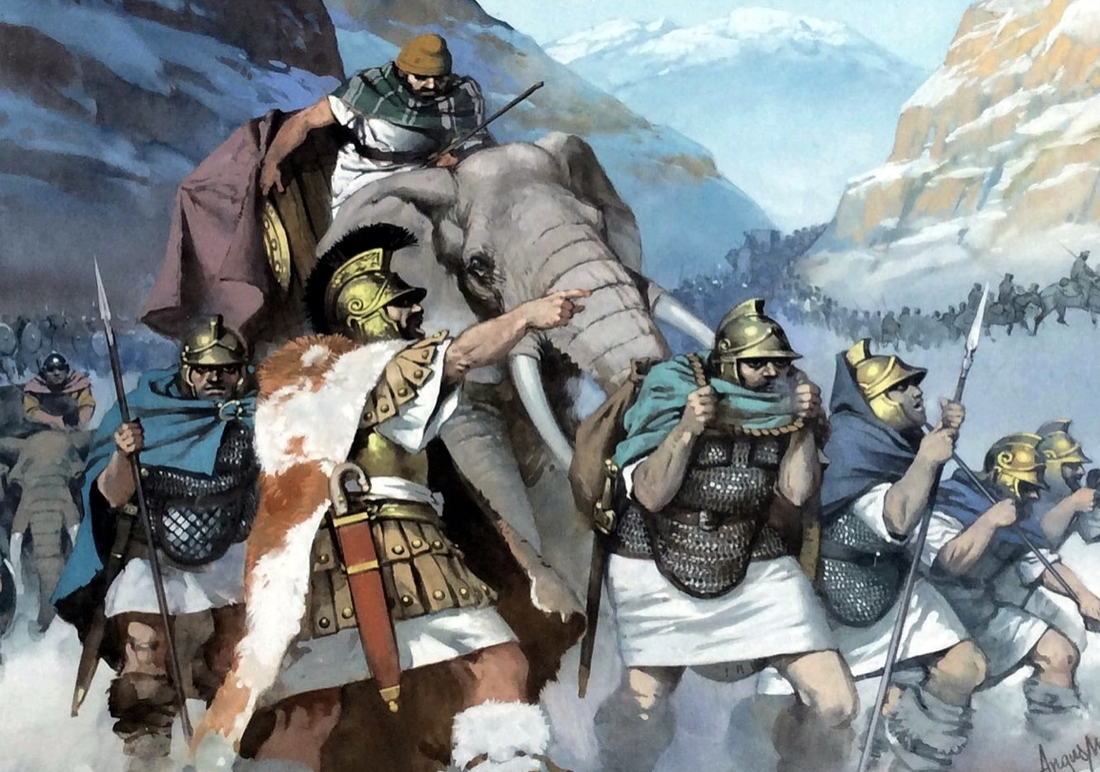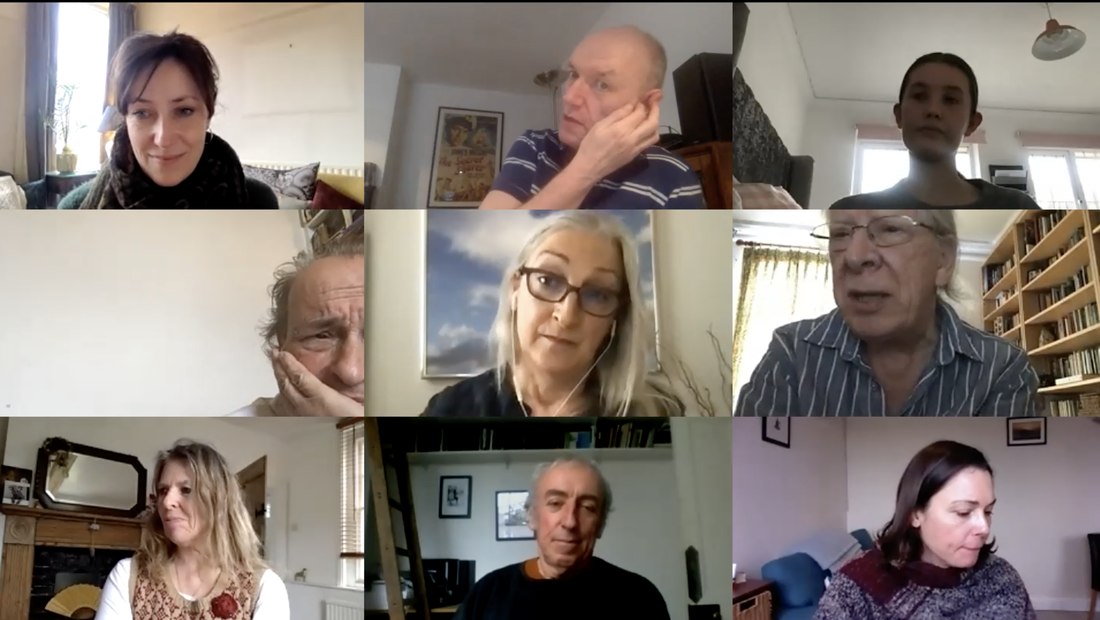Friday 6th October 2023
0 Comments
November 26th, 2021. Present (row-by-row from top left): David Whitworth; Colin Ellwood; Emi Herman; Amelie Eberle; Susie New; Susan Raasay; Charlotte Pyke
This was a slightly tricky read, partly of course because James’s characters express themselves and negotiate their complex moral dilemmas in long, nuanced, beautifully-modulated paragraphs - a joy when got right but very tricky from out modern 'un-performative/spontaneous/behavioural' linguistic norms, and double so when it's being sight read. The challenge was compounded here in that the only available text was absolutely encrusted with what initially appear as the oddest and most cheese-paring of novelistic stage directions, to the point where simply making out the dialogue from the surrounding verbiage in the heat of the moment was at times almost impossible. So it was a struggle, wading through entangled bracken with only a dim awareness of the overgrown path beneath. Doubly challenging, given that one of the central attractions of James’s characters is their supreme poise and self-possession. Watching them negotiate the complex moral dilemmas James throws at them is like being privy to an in-the-moment commentary by a group of bomb disposal experts collectively disarming an especially awkward enemy munition. James's characters are experts in moral disarmament, as it were. So under spontaneous 'reading' conditions, the necessary sureness of foot proved often very difficult to get anywhere near. It was hiking with ballet pumps on – but nonetheless - and very rewardingly - there were some characteristically heroic attempts - with some very quick-witted footwork and gusto in attack - from new attendees and regulars alike - with the consequence that the play's Rolls Royce engine intermittently and brilliantly kicked in, and its underlying potency could be glimpsed ...and what a deft, supple play by Henry James, written with a wonderful awareness of the expressive possibilities of the physical stage. More accomplished and richer in texture than pretty much all of (his contemporary) Oscar Wilde’s slightly rackety melodramas. Pared of its stage directions the play is revealed as stark and beautifully honed, making bravura use of continuous time and a single location – in this case the entrance hall of a slightly gone-to-seed country seat whose provenance stretches back to medieval times. The aged family custodian is dead. The heir is Captain Yule, a young radical politician who through family estrangement has never seen the place nor made any prior imaginative contact with his heritage. He is enticed to visit by Prodmore, a successful businessman with political aspirations, who wants Yule to marry his reluctant daughter Cora and convert to his mercantilist politics in return for the cancelling of the immense mortgages on the property the rights to which he (Prodmore) has acquired. The aim is that Yule become the local (puppet) MP. These were, after all, (at the time of the play’s writing) newly democratic times, and an 'old-family' MP would clearly be a very useful front for Prodmore’s Liberal ‘moneyed interest'. Moneyed interests being very much a thing then as now, of course, with Lloyd George flogging peerages and all. Yule’s central moral dilemma then is either to accept the deal, or to give up the house and his inheritance. Initially it looks like he will choose the latter, honourable, path. Cora, meanwhile, dare not resist her dominant father's plan, despite being in love with another young man who makes a brief hurried appearance at the top of the play. Into all this descends (literally and marvellously - having been rooting around in the upper gallery to savour the antiquities, with the aged family retainer's permission) Mrs Gracedew, a rich American widow much enamoured of and expert in English heritage. As the play progresses she gradually introduces Yule to his inheritance in the form of the house and its artisanal, Walter-Benjamin-esque 'aura', and persuades him of the accrued millennium-long love of which it is the material embodiment. At the same time she is progressively apprised of Prodmore’s complex machinations, the dilemma of Yule and the personal reasons for Cora's reluctance to acquiesce to her dad. The key, unspoken thing though is that it becomes slowly apparent to both Yule and Gracedew that the other is, like themselves, an evangelist for a cause (With Yule its socialism and for Mrs G the moral value of ‘taste’, the appreciation of culture and the good life) that they are each advocating to home communities from which they are themselves isolated (East London for Yule, Missoura Top for Mrs G); and that they are both also alone in terms of family. The play's fundamental underlying tectonic shift then primes their mutual and parallel escape from loneliness and into the possibility of a full life, by uniting Yule's radicalism and Mrs G's respect for heritage. The conditions for their unlikely love are discretely and thoroughly arranged by James, and when the pieces ultimately and unexpectedly fall into place, they plausibly represent a joint implicit mission to heal the political divide demarcating the culture wars of the time (and, arguably, of our time too). Given this slow, subtle assimilation, the ‘magic wand’ of the play is Mrs G’s money, which seems to know no bounds, and her waving of that wand to confound the venal Prodmore is so much more than the act of a crude Deus Ex Machina, in fact genuinely has a sense of theatre magic when it is applied, and (for Mrs G) it also has a theatrical sense of personal commitment to it. Here - to glance at a famous Wilde witticism - through the deployment of Mrs G's money, value decidedly drives out price, rather than the other way around. The upshot is that despite their age difference, Mrs G and Yule will marry (the theatrical effect of this depends surely in keeping the audience distracted from alighting on this possibility until the very moment it comes finally into play). Yes the play is a form of wish-fulfillment, of sympathetic magic,…but it is so well crafted, its characters so fresh, so accomplished and nuanced in their responsiveness, so unlike the ‘types’ of Shaw…so psychologically fluid and 'feeling', that it seems genuinely to work in the way that the resolutions of WInter's Tale or Twelfth Night work – the implausible is given by James as with Shakespeare a kind of elemental magical and psychic power. Mrs G is a needy, feeling goddess...and her magic power is money, Is it too much to call this a kind of 'myth drama' beneath the comedy of manners? Drama as balm, as healing ceremony on numerous levels. And ultimately enacting an escape from isolation and loneliness through the finding common ground with an opposite, and through acknowledging oneself - through birth or personal election - as being part of the main. The 'common ground' is - literally - rooted in the play's setting, the old family seat. Throughout, the house wears its symbolic significance as ‘England’ lightly and persuasively: heritage and tradition gone to seed and in danger of becoming a tomb rather than a home; of being destroyed by socialism rather than repurposed by it, and equally of becoming nothing more than a tourist ‘heritage’ commodity There are beautiful, deft dramatic effects throughout (the unspoken and moving revelation of the old retainer’s unpaid loyalty, beautifully tempered with a nod to his understandable keenness to pocket any money that might be going); the beautiful metaphorical enlisting of a literally-broken vase. The characters throughout are imbued with a sense of ethical ambivalence (including Yule and Mrs G). Even Prodmore transcends the Shavian chauvinist industrialist stereotype by displaying a genuine Rupert Murdoch-like acuity in verbal and intellectual combat. He is clearly at the top of a very good personal and business game. And of course overall there is the theme of political corruption, of money buying influence. Its not quite Granville Barker, but in its own Mozartian, subtle way it skirts the same swampy area. The central love interest could all be horribly sentimental of course - love dalliance as glutinous foregone conclusion. But in the same way that Brief Encounter avoids moment-to-moment sentimentality because the proponents play it straight and are complex characters who unsentimentally acknowledge and accept their operating in a cruel and unsympathetic world (the real one, in other words), this risk surely has the potential to be avoided if played properly And for all their distractive-ness, the ‘stage directions’ when studied at leisure are more than interesting. The initial assumption was that they were lifted from the originating James short story, but on closer inspection they are revealed as extraordinary proper director’s staging and interpretative notes, and they demonstrate a wonderful sense of the theatre and its physical possibilities. Assuming they are James’s own (they must be, surely, given his very wide experience of the theatre as a critic and spectator, and that they are clearly the work of a highly-sensitive artist), then on this evidence James would have made an extraordinary theatre director. He loved the theatre for what he saw as – at its best - its intensity of life; the extraordinary intuition and moral subtlety that could be elegantly, gracefully and thoroughly processed and attuned within a richly textured social milieu. The play was produced in London in the '60s with Eartha Kitt as Mrs G, and you can see how that idea might have arisen. With the right cast and direction, this is surely a great possible hit now, and even a necessary play for our acrimonious times . October 29th, 2021. Present (row-by-row from top left): Fiz Marcus; Colin Ellwood; David Whitworth; Jamie Newall; John Chancer; Amelie Eberle; Susan Raasay
Firstly and briefly, Daniel Ockrent’s short actor-musician ensemble piece, Seventeen. Seven brothers meet to mark the seventeenth birthday of the youngest, Esteban. The dangerous mammal in the room is the legend that the seventh son of a seventh son of a seventh son – which Esteban is – will on his seventeenth birthday turn into a werewolf. Over the course of fifteen or so minutes, this ‘unspoken’ fear slowly manifests and is addressed. At Esteban’s request his brothers tie him up and arm themselves with knives. It’s a beautiful simple ensemble take, deftly told and progressively more disturbing as the very real precautions and psychological effects take hold. Esteban launches obsessively into prayer, and what initially seems an arch and playful piece enacts a transformation of its own, into the experience of confronting - as a family, a collective – the prospect, however remote, of a terrible reality. Then the great Spanish dramatist Alfonso Sastre’s Ululame, inspired by Edgar Alan Poe’s poem of the same name that allegorically and in mystical terms explores the poet’s response to the death of his wife. Sastre brilliantly projects this strange psychological journey onto the biographical mystery of Poe’s movements immediately prior to his death in Baltimore. He was stopping off there while on a railway journey from Virginia to New York to retrieve some valuables from his beloved Aunt’s (and mother in law’s) home in New York, prior to his marriage of convenience to a childhood friend and fan. No-one knows with any certainty what happened to him in the two days he went missing before being discovered in an alcoholic stupor and in someone else's clothes. In the play Poe is already fragile with the cognitive and physical effects of alcoholism and opium addiction as he sets out alone. Beautifully and evocatively translated by Paul Rankin, Sastre captures Poe’s sense of self-estrangement and dislocation through tortuous circumlocutions and conversational false starts and misunderstandings. Once he reaches Baltimore, at election time with brass bands playing and all kinds of election shenanigans going on, the chaotic events of an incipient binge are filtered through the writer’s alcohol-induced psychotic state, and the inner ‘Ululame’ trajectory is projected onto the experience. For all its delusional, dream quality, the result is a hugely telling enactment of the madness of an estranged world and of the chaos of grief and loss. Poe is emotionally alive during the Baltimore psychosis since psychosis is surely an excess of meaning, and meaning is both something we all yearn for and of which grief deprives us. We share Poe’s distorted experience even as we glimpse beyond it the real chaos and randomness of his Baltimore exploits. Ultimately he returns to the sense of frozen dislocation that he experienced prior. Beyond that is his death, and then the constancy of his devoted old aunt in visiting his grave. Sastre’s Poe is a writer addicted to his visions as much as to alcohol, the latter being a comfort blanket against the cold blasts of reality and mourning. Without the visions and the meanings they validate - and that are symbolised by the possibility of reconnection to the spirit of his beloved wife – he is nothing. The play is a celebration of the unique imagination of Poe, haunted by his stories and poems - all of which seemed to grow out of his psyche’s imperatives - as well as a savouring of the fragility and innocence of the artist and of the reality of love, even where it cannot be properly received (as is the case with his Aunt''s long-suffering devotion to him). The play is both tragic and deeply funny, as Poe is buffeted through the Baltimore night like a hapless Buster Keaton, encountering apparently random lunatics and venal election agents and a gallery of grotesque characters as he repeatedly tries to make his train connection. And the (in reality) missing clothes? Corrupt election agents used to pay people to vote repeatedly, changing their clothes in the hope they wouldn't be spotted by the authorities. The money was often spent on drink. Read with relish and the group loved the play October 8th, 2021. Present (row-by-row from top left): David Whitworth; Colin Ellwood; Fiz Marcus; Marie Collett; Amelie Eberle; Simon Furness; Sophie Juge; Kevin McMonagle; John Chancer; Jamie Newall; Samuel Meyer; Julia Winwood
Good to be back after about two months summer break. And to be exploring a play as good as Von Kleist’s extraordinary political/expressionist psychodrama from – would you believe - 1809, in this ‘version’ by Dennis Kelly, from the Donmar in 2012. The eponymous Prince is a naïve, arrogant, impulsive, entitled, feted, vague, disconnected, juvenile, indulged cavalry commander in the Prussian army of the Great Elector fighting the Swedes for survival in the late C17th. Exhausted from relentless combat and prone to sleepwalking, he is discovered by the Elector and his entourage sleep-enacting/dreaming what seems to be a kind of personal myth – plaiting a laurel wreath of victory for himself. The Elector responds by doing what C20th dictators became very good at: he manipulates the Prince’s dream/myth, in this case by weaving his own (the Elector’s) chain of office into the wreath and having the court’s ‘anima’ - Princess Natalia - present it back to the Prince, still as he dreams. It’s a wonderful composite image – an eroticisation of military victory in the service if the state. The intensity of the Prince’s response spooks the courtiers and the Elector. Something obsessive has clearly been triggered, something implanted or amplified in his psyche. As the courtiers retreat, the Prince, still dreaming, snatches Natalie’s glove, and this further validates the Prince’s merging of dream and reality when, awakened, he discovers that the ‘real-world’ incarnation of the ‘dream-glove’ is indeed Natalie’s. In his subsequent schizoid/fugue state, he can’t focus on the convoluted military briefing for the next combat, and the eroticised myth/metaphor/dream world overwhelms him: In the past fortune has glanced in my direction, touched my hair, cast the odd favour at my feet. But now she rushes at me like a bullet fired from a gun, the wind lifting her veil so I can see her face and she is smiling. She is smiling at me. I think I shall search her out on this battlefield today – and even if she is chained to the Swedish victory cart I will rip her free and all her blessings will be mine. Later, presumably still at the mercy of this myth-reality, he disobeys orders and attacks the enemy when he should have held back, in the process behaving with extraordinary arrogance and ignoring the pleas of fellow officers charged with the task of managing his renowned impulsiveness. On the one hand, his actions win the battle; on the other, disobeying the Elector’s orders is a capital offence, and the Prince is accordingly arrested on the Elector’s orders. This seems potentially to set up a battle between pre-modern magical/mythical thinking and ‘modern’ managerial instrumentalism as the appropriate driver of action in relation to the state. But the Elector clearly involves himself with both. Is he looking to engineer Homburg as the perfect totalitarian disciple, 'breaking him in', so to speak, to a point where law/instructions and instinct are one? Or is he just teaching him a lesson, or even eliminating a potential rival? (In accounts of the battle, the Elector doesn’t come out terribly well, but Homburg is lauded. And Homburg’s tacit marriage proposal to Natalie threatens to remove her potential usefulness to the Elector as a diplomatic ‘marriage pawn’). Or maybe the Elector is just as he claims, a stickler for (his new imposition of) military micro-managerial instructions Still in his adolescent ‘myth-world’ the Prince doesn’t take his death warrant seriously, dismissing the subsequent court martial as just a chance for the Elector to enact his own entry into the Prince’s fantasy: How could he have paraded me before that table of judges, hooting their song of death at me if he himself did not intend to enter their circle, god-like, and overthrow the verdict? My friend, he has amassed the storm clouds around my head so that he may rise through them like a sun and pierce my gloom But when it looks like his is going to be a real execution and not a mythical/symbolic one, he falls apart. I have seen my grave. I have seen my grave on the way here, by torchlight. I saw the open hole that will receive my body tomorrow. Aunt, these eyes that look at you now are to turn opaque and dull, shadowed with death. This breast is to be pierced with the cold metal of bullets. Already they’ve sold the seats in the windows that overlook the marketplace where my blood will pour from my veins, and he who currently stands before you on life’s summit looking forward into the future like it were a myth will tomorrow be rotting in a box with nothing but a stone to say ‘He Once Lived’. He repudiates Natalie to her face and cravenly and humiliatingly begs for his life. It seems the classic ‘Franz Klammar’ moment of someone who has previously been able to operate on instinct in pressured situations suddenly waking up/looking down and having to deal with an enhanced sense of real-world consequences. Everything that happens to him feels like a dream (as he continually remarks) until it doesn’t. But then something even more subtle and interesting ensues. Natalie confronts the Elector, aiming to get the Prince exonerated as a ‘child’, but quietly as a back-up she also arranges the mobilisation of military forces that could potentially stage a coup if the Elector doesn’t acquiesce. But he seems to do exactly that, writing a letter offering the Prince total exoneration, ready for Natalie to take to the Prince’s cell. When the Prince subsequently reads it, however, the condition demanded by the Elector is the logical one that the Prince state that the Elector was wrong to condemn his (literal) insubordination in not following orders ‘My dear Prince of Homburg, when I ordered your arrest for disobeying orders with your premature attack, I believed I was doing my duty. Indeed I believed that you yourself, as a general and a man of honour, would’ve approved my actions. So I ask of you this question – if you believe that I have done wrong then give me two words and I shall send you your sword upon the instant’. The Prince won’t do it. He calls the Elector’s letter a ‘masterpiece’ and says: I will not stand so unworthy before him who stands so worthy before me. I am guilty as charged, as well I understand. But if he can only forgive me if we dispute the facts and force me into a lie, then I’m not interested in forgiveness. It looks as if the dream, the ‘golden chivalric myth’ is again trumping the sordid, terrifying reality of death. Or even that - given that it was the Prince's ‘mything’ and his ignoring of the Elector’s ‘managerial’ instructions that got him into trouble in the first place - his accepting of the death sentence occasioned by the latter is a kind of integration of both myth/dream/instinct and law/instruction/reality/death, such that both can be ‘held’ together in the imagination. Which of course in a sense is the perfect totalitarian (and proto-fascist) state of affairs (and affairs of state): law becoming instinct in pursuance of the primal myth of authority. And when this ensues in a death, then this symbolic/real erasing of the individual in relation to the ‘myth’ of the state is surely a welcome additional emblem of self-abnegation. The thrust of this seems to be consolidated in another fascinating, deft and well-engineered phase of the play. Now Natalie swings into action with her ‘plan B’, engineering a confrontation between the military and the Elector in support of the Prince. One officer’s argument to the Elector – the veteran Kottwittz – is surely key: You talk of rules? The highest rule is that which beats in the hearts of your generals, it isn’t written with papers and pens. It is an ideal. It is the flag of this Fatherland we build, it is the crown and he that wears it. Rules? Why should it matter to you what rule defeats an enemy, so long as that enemy is defeated, so long as he lays at your feet. The rule that destroys those who threaten you and your people is the only rule. But of course the opposition between rules/laws and instinct here is in many ways a false one. The ‘rules’ they have in mind are ultimately not there to enforce rights of the individual for example, but just slightly different means of ensuring the same result as would whatever emerges from ‘that which beats in the heart’. Could the Elector very cleverly be ‘catechising’ this answer all along - just as he manipulates the Prince’s self-condemnation through appearing to offer the opposite (the Prince’s acquittal?. Wonderfully, Kleist leaves this possibility in play, along with the opposite, that the Elector is being put under severe pressure and simply responding to events in order to try to save his own skin. The protest/debate is closed down anyway when the Elector produces his trump card – the Prince himself, who declares himself for death. And here the Kelly ‘version’ and Kleist’s original diverge. In the former, the execution is carried out, with conspicuous lack of support of the military and the court. It’s a crude and brutal account of a straightforward political killing that surely overplays the ‘fascism’ of the Elector and suggests he won’t last long (when I fact we know that the regime set up by the Prussian ‘Great Elector’ lasted very long indeed, and with ultimately terrible consequences). The original is much more disturbing, and surely much more telling in relation to the ability of modern autocracies to get into the heads and dreamworlds of its inhabitants: At the apparent moment of execution, the Prince’s blindfold is removed. There follows the staged-managed (by the Elector again) apparent continuation of the Prince’s myth/dream from the beginning of the play. Natalie crowns him with his laurel wreath, puts the Elector’s chain round his neck, and presses his hand to her heart. He faints – a mythical/symbolic rather than a real death - and on reviving he asks if it has all been a dream, to which the courtiers reply ‘yes’. Brecht does a very similar thing with Galy Gay in Man Equals Man regarding his renouncing his former identity to become the perfect fighting man. It is the creation of the perfect totalitarian subject through the unifying of law and instinct in pursuit of an image that fuses also personal honour (the wreath), the state (as embodied in the ruler – hence the Elector’s chain) and erotic desire…(Natalie). And to have all that experienced at the level of dreams. Kind of what Hitler and Stalin did, surely? Immediately after this, the play ends with them all charging into battle defying the enemies of Prussia/Brandenburg The difference between the characters and the audience is that we have the option of seeing this process from the outside. Whether Kleist did (see it from the outside), is surely a moot point, but the tortured quality and general tenor of his work surely suggest that sometimes he did and sometimes he didn’t – which ambivalent position also surely is conducive to the most telling and effective of art And of course that inside/outside-the-dream vision – that accommodates the cool perspective of a Brecht on the mechanisms of power, along and the interior schizoid intensity of the Expressionists – would make for a very interesting production challenge An extraordinary and richly ambiguous play, then, full of vivid secondary (military) characters, reminiscent perhaps of Renoir’s Le Grande Illusion, and with at its heart three very modern, psychologically acute, ambivalently-drawn individuals: Natalie, the Prince and the Elector. And in the case of the last of these, also one of at mystery: potentially a Grand Inquisitor, the Duke from Measure for Measure, but genuinely put under pressure in conducting his exorcism, his psychological vampiric rebirthing of his acolyte the Prince On Friday all given a characteristically characterful and urgent reading (and we read both the ‘Kelly’ ending, and Kleist’s original) C.E. April 30th. Present (row-by-row from top left) Oystein Brager; Colin Ellwood; Susan Raasay; Jamie Newall; David Whitworth; Zara Tomkinson; Daniel Lien; Charlotte Pyke; Marta Stark
I have to scream but my sound-card is bust. I do not know about feeling. Or feelings. That’s the way it is. I mean my sound-card is functional but is nevertheless insufficient. If I scream it does not rasp. I have understood that screaming must rasp a little. My vibrations are so Sumerian. So asserts the puppy-ish, well-meaning, just-minted android at the centre of Norwegian actor and playwright Daniel Lien’s new script-in-development, translated by Neil Howard and arriving courtesy of Unge Viken and their dramaturg our good friend, playwright and director Oystein Brager. Life, eh? Most of the characters here experience their own ‘sound-card’ moment when existence gets more than a bit unbearable…or inexpressible…or both. This play certainly has its own rasp…in the sense that the form is challenged by the ambition of the content, pressure-tested almost to destruction. Or maybe not a rasp so much as a kind of joyous enquiring, discoverous yelp of exhilaration, brimming as the play is with philosophical, situational/narrative and dramaturgical ideas perhaps even slightly at odds with each other: kittens play-fighting in a sack. Hearing it read is like being buttonholed by a ragged ancient mariner whose experience has been of computer games and futurology rather than multi-coloured snakes and the sea (and Coleridge’s ballad gets more than a name-check in the play) but with similar results: the generation of a kind of distressed wonder. The ‘plot’? Here goes…stay with me on this…: A Roman general is in shock from a martial encounter with giant penis-nosed monsters. In Trondheim in 2050, a scientific genius, Astrid, puts the finishing touches to a new-developed AI android intended for the military-industrial complex. Meanwhile her ex-husband, Thomas, a celebrity internet priest with an alcohol problem who has just denied the existence of God via livestream, turns up in a chic rotating skyscraper bar in Trondheim looking for a drink and some company. There is a tremor…something cataclysmic is happening. As we later discover, a nuclear explosion has, amongst other things, flattened Oslo and occasioned a slow-encroaching, potentially planet-wide nuclear winter. Trying to reach still-habitable Tondheim, young Asian guy Hamza has ignored the distress calls of a young woman stuck beneath the ruins of Oslo, to his own distress and guilt. A month passes. The ex-priest and existentially-troubled young waitress Spesi (an ex-soldier and sometime journalist/activist) are now trapped in the bar. Hamza arrives and is initially mistaken for a terrorist but ends up having continually to rebuff the sexual advances of Spesi. Over time, the android outperforms expectation, not least in the emotional department (and in doing so makes us question the definition of organic life, and of the supposed organic uniqueness of the felt quality of being alive. This is central to the main thesis of the play). ‘Christened’ Galileo, the android is also able to tap into the memories of those around them, thus ingeniously serving up a vehicle for delivering backstories and key memories (and allowing the android actor a virtuoso turn playing each remembrancer’s interlocutors). The most emphatic of these remembrances traces the relationship between Astrid (Galileo’s ‘mother’, as they – Galileo - insist(s) on calling her) and Thomas, from their initial meeting at university via marriage to their separation - this last event seemingly occasioned by Thomas hinting in his great god-denying streaming event at the existence of the top-secret Galileo project. As everyone closes in on the increasingly precarious shelter of the revolving bar, Astrid seems to want to deny the human/organic affect of Galileo, who is meanwhile trying to acquire a personality, a sense of humour, friends, and to bond with both his ‘mother’ and his putative father, Thomas. Astrid decides she wants to decommission Galileo (maybe because their – Galileo’s - intended role as a ‘link’ between humanity and technology is now redundant, or maybe because the raw materials in their mechanisms can keep the restaurant warm for a while as the world outside freezes…or maybe both). Thomas declares paternal love for Galileo, then goes out into the snow (presumably 'for some time’, Captain-Oates-like), possibly in search of his wife, possibly to die, possibly to commune with nearby 12th Century Nicaros Cathedral (which is characterised here as an earlier incarnation of the human aspiration and ingenuity that resulted in Galileo). In the 21st Century environs of Nicaros, our Roman general mysteriously turns up (or is this whole ‘simulation’ in fact simply a virtual computer-game world called in this instance a play?). Astrid also arrives, just before Thomas dies of hypothermia. Back in the restaurant and now joined by Astrid, Hamza and Spesi are trying to find a way of saving themselves from the cold. Trondheim now burns (having been set alight by Astrid) as the world freezes. Neither Hamza nor Spesi can be persuaded by Astrid to help her ‘kill’ Galileo. Hamza kills Astrid instead. Oh, and slightly earlier the Roman general has walked in on Galileo, taking the latter to be the divinity he has long been in search of. During what happens next, the former finds out the true nature of the penis-nosed creatures, and Galileo ingests the experience of the general and so, presumably, of the classical world. This is an android who marches - and more importantly learns - via his gut, his ‘tummy’ (as he endearingly puts it himself), even if that emotion-driven organ is a virtual entity in their case. Thereby of course they absorb(s) – and so preserve(s) - the experience of the people they meet(s), and…er…sometimes ‘eat(s)’ (although doing that with only a virtual stomach is surely a very messy and here unexplained business…). The carbon-based survivors then duly die of cold. Galileo remains, being told ‘it is your turn now’. They (Galileo) are clearly then - amongst other things - a high-functioning version of that other space probe Voyager’s ‘golden record’ of human and earthly experiences and attainments, having in their case digested (or at least 'ingested' - literally and metaphorically) a lot in a short ‘life’. Our collective human future, it seems, is to be virtual not actual, and it may not actually involve us…but maybe that absence, or transfiguration, doesn’t matter… That speculation is very much the central one of the play, which is therefore a dramatised account of a societal and experiential transition, a passing of the baton, as all good plays surely are. At least I think all that – or something like it - is what happens… Never have a group of actors had so much fun while entertaining so hazy a sense of what is actually going on in the play that they are sight-reading aloud…. One way of thinking of all this is: if tyro Galileo could write a play, then this might be it. But I’d only offer that formulation if it can be taken as a compliment, because there is a great deal in this exhilarating if unruly play to be complimentary about. The ever-quirky and lively plotting and character motivation sometimes have a comic-book/video-game/sci-fi feel but is that a bad thing? After all that is not the point - the script is clearly an exuberant vehicle for the exploring of authorial ideas and Sterne-ian ‘hobby-horses’ (a dramaturgical mode last sighted when Bernard Shaw was still wearing his organic Jaeger suits and playfully turning out dramatic provocations…and, I have to say, that’s a mode much missed amidst the comparative conceptual poverty and nailed-down earnestness of much recent drama). And there is some tantalising motivational nuance and complexity, at least in the depiction of the central Astrid/Thomas ‘backstory’ that drives the familiar dialectic around the efficacy of ‘arid’ science versus ‘woozy’ religion/art, which is here nicely formulated: ASTRID: You’re right. I see the invisible, you see the imaginary. An example of the quality of the writing (and mindful also of Neil Howard’s excellent work in translating here), this is, again, Astrid about Thomas: I have never been able to love anyone. But do you know why I married you, Thomas? Why I conceded to imagining myself in love? Because even though I lacked that sensitivity I could rejoice that it was present in you. And you were so hard, so good with words, so fantastically brazen. I thought we could bring out the best in each other. But you’re just words, Thomas. You never do what you say you’re going to. You begin every day with a wish for improvement but wishing is all you’re capable of. Sometimes you lie about what you’ve dreamed just so you’ve got something interesting to say. I thought it was embarrassing to begin with, now it’s become pathetic. I’ve been poison to you, I can see that. Because you’ve wiped out more and more of yourself every day. I caught myself thinking terrible thoughts about you. And I just had to stop myself. How could I be so awful. Because there isn’t a person left to be awful to. I can’t see you anymore, Thomas. Ok the figure of the emotionless scientist is a little familiar, perhaps…but it’s a great speech. In Galileo’s terms this relates to the ‘tummies (or at least virtual tummies) versus brains’ opposition. Further – related - lines of investigation in the play evaluate the efficacy of video game experience versus religion as engines of authentic human development. All very stimulating. The play’s hero is ultimately last-entity-standing Galileo…who means well and has a good...er... soul….and who ingests things for the best… They - and indeed everyone - is lonely. A sense of humour is proposed as the great signifier of human-ness – and Galileo haltingly acquires his. This is a bildungsroman for the AI generation…and the AI generated. Oh, and did I mention the constant fast-paced, clever, almost ‘30’s-screw-ball-comedy’ dialogue that occupies the gaps between the soap-box Douglas Adams-ing? If I was putting a stern dramaturgical face on, I would recommend deciding what the audience should be given for free (so not have to think about...), in order for them to be able to focus on the things that really matter in the play (such as the ideas, the central debate, and the wonderful, un-anchored, homing-trajectory ‘exocet missile’ of the penis-monster-traumatised Roman general etc.). So, a clarification of some of the dramaturgical devices employed and of the time and causality sequences etc. etc. (in terms of the likely real-time perceptual, apprehensive, construing and…er…digestive capacity of an audience). But as with Galileo them/her/him-self, such learning may ultimately be autonomic…and simply a question of spontaneous ingestion - and getting to grips with those Akkadian/Sumerian (and in fact surely pre-Sumerian) vibrations March 26th. Present (row-by-row from top left) Charlotte Pyke; Colin Ellwood; Emma Cawley; Simon Usher; Susan Raasay; David Whitworth; Juliet Gray; Kevin McMonagle; Zara Tomkinson; Valerie Gogan (pictured below)
By way of complete contrast to recent sessions, here a relatively early (but in broader terms, relatively recent) David Eldridge single-set four-act ‘chamber’ drama originally produced at The Bush in 2004. Clearly the writer is channelling – and presumably re-working - very personal memories from Romford in the early ‘80s. Eleven-year-old only child John is the loved focus of his parents’ life. His mother Alice is trying to get him to read David Copperfield as preparation for a scholarship bid to get into public school, but his market trader dad seems less keen. John is definitely not a Dickens fan, nor of any grown-up books, and is also falling out of love with his Subbuteo set, at least as far as playing against his father is concerned. In fact he is now obsessed with projecting ‘Mutually-Assured-Destruction’ cold-war tensions onto his toy soldiers, in the process using them to manage and simplify all kinds of anxieties, including the fall-out from his parents’ rocky marriage and the slow impingement of the adult world into his childhood Eden. By means of the playwright's slightly creaky dramatic device, through which John ends up hiding in a large cardboard box, he overhears his mum's marital-row revelation that she is sexually bored with her husband and has slept with the quietly charming (and as it turns out deeply dishonest) Luigi, a conjugal bystander who helps out on dad's market stall. Complicating things is the fact that John has shared some of his fears and imaginings with Luigi, including his vivid sense of the consequences for himself and his parents of the likely forthcoming nuclear holocaust. In the vividness of John’s apocalyptic imaginings and in the managing of his fears through proxy toy figures, there are surely signs of the budding dramatist in John. On the morning after his mothers’ revelations, he tries to restore his sinking Eden and to ensure his parents stay together by making them a breakfast of what he imagines to be comfort food (biscuits and eggs). It is his hope that thereby ‘mutually-assured (domestic) destruction’ will be avoided. The final act leaps forward twenty years. John is now a finance trader, waiting in the familiar (but now gussied-up) family living room with only his father’s sealed coffin for company. The proximate cause of his father's death was impact with a bus, but it turns out dad was also riddled with cancer. Thereby dramaturgically combining the evocation of metaphorical rottenness with the possibility of unfinished father/son business. Luigi unexpectedly arrives to pay his respects, having disappeared from the family orbit shortly after his role in the family ruction was revealed. In the ensuing exchange we hear that John’s parents stayed together but things were never the same – they ‘lost’ themselves, somehow. John meanwhile never got his scholarship, but his parents scrimped to send him to public school anyway. Now his life and job feel meaningless, he is alone, strangely estranged from all society, and brought up in such an emotionally 'cold-war' environment that he finds relationships impossible. The play seems to imply that maybe had the family not compromised and instead let rip with their feelings – in other words gone for ‘mutually-assured destruction’ after all - then something creative and true might have grown from the ashes. As it was, they had all spent their subsequent lives in uneasy, sterile stalemate. Overall, in post-reading discussion, the feeling seemed to be that the play offered a heartfelt, detailed and at times brutal depiction of domestic desire and disappointment; also a broader mapping of the societal shift from the fearful 70’s to the selfish, uncompromising, Thatcherite 80s/90s, with John’s parents somehow hearkening back to the earlier, retractive, deferential period. The portrayal of the young John, clinging to childish ways and language, yet both terrified and strangely fascinated by the adult world, is beautifully done. On the other hand, sneaky Luigi comes across as a somewhat sketchy and incoherent character, and the play’s recourse to revelatory melodrama has the whiff of East-Enders' closing drumbeats. The latter-day sentimentalising of the memory of the father seems a little overdone, but John’s investment in his toy soldiers as an almost cargo-cult ‘mythical’ totem for managing life’s complex issues - a kind of cold war anti ‘glass menagerie’ – is strangely and at times almost eerily compelling. This latter lends a kind of symbolist and religious ambiguity to an otherwise realist play. Also the sheer plangency of the - at the time - tacit parent/child love and sacrifice (fuelled by a kind of Hardy-esque 'yet we were turning away' regret and by the final-act ‘attention must be paid’ paean to the long-suffering selflessness of the dad) is difficult not to be affected by. With all its intricate naturalistic details and at times searing, unglamorous portrayal of family life, this is ultimately a play that turns on a big, bold emotional axis. And here also was a chance to explore the work of a very accomplished dramatist at a relatively early (Strinbergian/Ibsenite-border) stage of his development, within the strictures of 'domestic' four walls, four acts, and four characters. |
INDEX of dates:
INDEX of playwrights and plays:
INDEX of contributors:
|











 RSS Feed
RSS Feed
